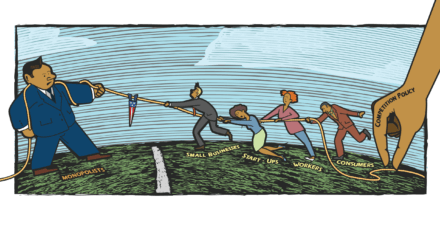A new vision for antitrust enforcement in the United States

The Washington Center for Equitable Growth late last year held an event, titled “Restoring Competition in the United States: A Vision of Antitrust Enforcement for the Next Decade,” to discuss its new antitrust transition report. The report is the work of seven academic experts with deep policy experience in antitrust enforcement. It begins with an assessment that the United States suffers from a growing monopoly power problem, which increases the cost of goods and services, lowers wages, limits innovation, and exacerbates inequality. The courts, Congress, and the antitrust enforcement agencies all share responsibility for the rise of monopoly power.
The report offers three foundational policy actions to reinvigorate competition policy to ensure current and future economic growth is strong, equitable, and sustainable as the U.S. economy recovers from the coronavirus recession:
- Enact new antitrust legislation and increase resources for antitrust enforcement
- Revitalize antitrust enforcement to strengthen deterrence
- Commit to a “whole government” approach to competition policy
Through these actions, the U.S. government can shift the nature of competition and reestablish the United States as a nation dedicated to promoting innovation, competition, and economic equality. Below is a brief summation of each of these policy actions.
The report is authored by Bill Baer, a visiting fellow (on leave) in government studies at The Brookings Institution; Jonathan B. Baker, research professor of law at American University Washington College of Law; Michael Kades, director for markets and competition policy at the Washington Center for Equitable Growth; Fiona Scott Morton, the Theodore Nierenberg professor of economics at the Yale University School of Management; Nancy L. Rose, the Charles P. Kindleberger professor of applied economics at the Massachusetts Institute of Technology; Carl Shapiro, professor of the Graduate School at the Haas School of Business and the Department of Economics at the University of California, Berkeley; and Tim Wu, the Julius Silver professor of law, science and technology at Columbia Law School.
Watch a recording the of the event.
Overview of competition policy
Antitrust scholars recognize a shift in the competitive nature of the U.S. economy; large firms’ increased profits come at the expense of their workers, customers, and competitors. While mergers in some industries, such as beer, may seem harmless, in reality, they frequently increase prices for consumers.
The antitrust laws today come up short in deterring anticompetitive behavior. One study of manufacturing plants found that mergers between competing firms resulted in increased markups yet little to no improvement in productivity or efficiency. Looking into an array of industries (for example, television, home building, dialysis centers, and even vitamins) reveals evidence of anticompetitive behavior and growing market power, along with its effects on wages, prices, or competition.
During the event, Dan Crane, professor of law at the University of Michigan, expressed skepticism with the report’s conclusion that the U.S. economy as a whole faces a competition issue. “[Competition] is a market-specific problem, and to recognize that fact is important to understanding the implications for legislation, reform, funding, and targeted enforcement going forward,” said Crane.
To that point, the authors of the report write that while antitrust enforcers should look at industries where there is evidence of anticompetitive conduct, on average, increased competition across the U.S. economy would address issues of inequality. Modern research indicates that growing market power hurts consumers, competitors, and vulnerable communities. The authors point to the macroeconomic implications of such market power increases, including decreased wages among low-skilled workers and a slowdown in output and Gross Domestic Product.
Rises in market power contribute to increases in income inequality. Low-skilled workers receive a lower share of profits, while stockholders and higher-skilled workers receive a higher share. Growing market power often is seen alongside monopsony power, where a single firm is the buyer of labor and has the power to set wages and working conditions for employees. Employer consolidation has effects on high-skilled workers. Evidence in the healthcare industry, for example, shows us that hospital mergers account for negative wage growth among high-skilled healthcare professionals but not mid- and low-skilled workers.
Enact new antitrust legislation and increase resources for antitrust enforcement
Flawed legal precedent and disproven economic theories haunt antitrust enforcement today. Over the past 40 years, the federal courts relied on antiquated neoclassical economic theories that resulted in widespread approval of anticompetitive practices. Simply asking for stricter enforcement will only have limited impact on widespread market power. Congress needs to update the antitrust laws to explicitly outline what the laws should prohibit and to prevent the courts from narrowing antitrust protections.
Doing so can prevent the courts from leaning on arguments that are skeptical of enforcement. The authors say that successful legislative reform would accomplish the following:
- Correct flawed judicial rules that reflect unsound economic theories or unsupported empirical claims
- Clarify that the antitrust laws protect against competitive harms from the loss of potential and nascent competition, especially harms to innovation
- Incorporate presumptions of illegality that better reflect the likelihood that certain practices harm competition
- Recognize that, under some circumstances, conduct that creates a risk of substantial harm should be unlawful even if the harm cannot be shown to be more likely than not
- Alter substantive legal standards and the allocation of pleading, production, and proof burdens to reduce barriers to demonstrating meritorious cases
The co-authors of the report argue that substantive antitrust reforms, procedural reforms, and providing financial resources to the antitrust agencies are critical for protecting competition.
In order to deploy these initiatives, the two federal antitrust enforcement agencies—the Federal Trade Commission and the U.S. Department of Justice’s Antitrust Division—need resources. The report recommends an additional $600 million in funding, which would compensate for stagnant funding over the past decade and allow for significant expansion of the three antitrust enforcement areas: criminal, merger, and civil nonmerger enforcement to address the growing market power problem. Additionally, more funding will enable the two agencies to conduct economic policy studies and merger retrospectives, and allow agency enforcers and economists to advocate for competitive practices throughout the government.
A commentator at the Equitable Growth event, Ganesh Sitaraman, professor of law at Vanderbilt University, was supportive of the reforms proposed in the report but advocated for a broader approach to the issue. “We should think about legislation not in just the narrow, but in multiple sectoral domains, if we want to infuse our economy with the spirit of competition,” said Sitaraman. New legislation, he said, can protect existing and possible competition, and should explicitly identify behaviors that are anticompetitive.
Countering that point, commentator Josh Soven, attorney at Wilson Sonsini, argued that while aggressive antitrust enforcement is important, legislative reform is not the route to take to promote competition because the government’s success in stopping potentially harmful mergers lies in the strength of the cases and evidence they bring to the courts. He said that building an unwavering case rather than reforming the antitrust laws will warrant a competitive outcome. The authors of the Equitable Growth report, however, see legislative reform as the strongest pathway toward improving issues of competition such as deterrence.
Restoring competition in the United States
November 19, 2020
The state of U.S. federal antitrust enforcement
September 17, 2019
Revitalize antitrust enforcement to strengthen deterrence
On the topic of legislative reform, the panelists discussed the report’s recommendations for revitalizing antitrust enforcement to strengthen deterrence. Deterring anticompetitive behavior is crucial for effective antitrust enforcement. Current legal rules make that goal more challenging; courts too often have to set the threshold to prove a violation so high that the benefits of violating the antitrust laws exceed any possible penalties. In an economy where market power is common and spreading across various industries, strengthening deterrence requires a strategic enforcement agenda where the agencies target specific problems and leverage their resources to address them.
A successful agenda depends on leadership. The seven co-authors of the new report believe that new leadership must recognize that market power is a problem and must be committed to addressing it. They must understand the challenges faced by the agencies and stay committed to creating and executing an agenda that optimizes deterrence and protects the economy from anticompetitive behaviors.
On the topic of leadership, panelist Marc Lanoue, Federal Trade Commission attorney who has been detailed to serve as counsel for the minority on the U.S. Senate Subcommittee on Antitrust, Competition Policy, and Consumer Rights, said that it is “important to select leaders that have a shared vision on competition policy enforcement … it would be helpful to have leaders at the Department of Justice and Federal Trade Commission who are willing or even eager to collaborate not just on enforcement but also on longer-term projects of steering the law in a positive action to protect competition.”
Once strong leadership has been established, building a strategic enforcement agenda is the next priority. In developing an agenda, each agency should consider three approaches.
An industry-driven approach, where specific industries that suffer from repetitive instances of anticompetitive practices would be identified, would allow the agencies to hear cases in specific industries and coordinate with relevant regulatory bodies to address issues of competition. A harm-driven agenda identifies the ways anticompetitive behavior has harmed specific groups and addresses them through enforcement actions. Lastly, a doctrine-driven agenda identifies problematic anticompetitive conduct, and develops rules and doctrines that the courts can use to prevent such conduct.
Commit to a ‘whole government’ approach to competition policy
The second segment of the event delved into the third recommendation in the report: making competition a governmentwide priority to help address the growing market power problem. Antitrust enforcement is not the only tool to protect competition. Numerous agencies currently influence competition in the United States—sometimes implicitly, sometimes explicitly, but rarely coherently. The report recommends establishing a White House Office of Competition Policy to ensure that regulations do not unintentionally undermine competition and that the Federal Trade Commission uses its rulemaking power to promote competition.
The Office of Competition Policy would exist within the Executive Office of the President and be led by the National Economic Council. It would include members of various economic policy groups and offices. Among them would be the Council of Economic Advisers, the Office of Management and Budget and its Office of Information and Regulatory Affairs, and the Domestic Policy Council. The establishment of a White House Competition Policy Office would support the “whole government” initiative by promoting regulations that improve markets and competition, preventing any rulemaking that may harm workers or consumers, and liaising with the agencies and other regulatory committees to tackle industry-specific issues of competition.
The report also recommends that the Federal Trade Commission should turn to rulemaking as an appropriate tool to protect competition. For example, although a different agency, the Federal Communication Commission’s phone number portability rule allows customers to transfer their numbers between phone carriers, making it easier for consumers to change carriers and thus increasing competition between those carriers. Similar to the FCC’s actions, the FTC could use its rulemaking to similarly promote competition.
Conclusion
The new Congress and the Biden administration have the opportunity to reverse the problems that plague U.S. competition. The goal of Equitable Growth’s recent antitrust transition report and its corresponding event is to elevate policy initiatives and ideas that promote a competitive economy. Reviving a procompetitive system will boost economic growth and innovation, create new jobs and lift wages, and protect our nation’s most vulnerable people from the harmful consequences of market power and monopolies’ profit-making.





